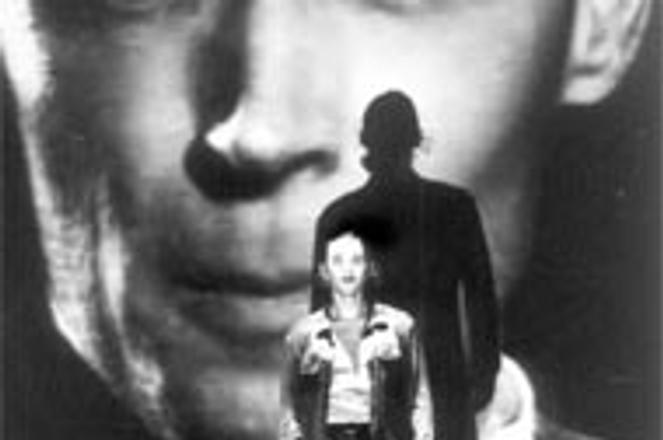Martin Vraný as Romeo speaks to Ján Galovič as priest.Peter Brenkus
Slovakia's first professional modern dance company, the Bratislava Dance Theatre (BDT), is starting the second year of its existence with an exceptional performance of the classic Romeo & Juliet.
"This is not a traditional performance," said Robert Meško, BDT director. Instead of the traditional love theme, Meško warned, the BDT staging "is also about hate, stupidity and coincidence." Nikita Slovák, who wrote the lyrics for the production, said that the idea had been to make the story more relevant to contemporary experience. "This decade doesn't care about anything, even about deep love."
The BDT production of Romeo and Juliet combines music, lyrics, video and a stage set. The musical element includes rap music and Slovak folk songs, and was concocted by the Slovak composer 'Henrich' and recorded by the Košice Philharmonic Orchestra.
This Romeo and Juliet is more theatre than dance program, and the dancers have a number of speeches to make in Slovak and Czech. The paradox is that the dancers understand each other's language, but are divided along family lines as Capulets and Montagues.
BDT choreographer Ján Ďurovčík has also put three big video screens on stage, on which professional Slovak actors appear as extras to the performance, almost as members of the cast behind the dancers who are live in the foreground.
In the end, the audience is intended to become part of the story. Ďurovčík puts red dye into three glass containers filled with water, representing the three people killed in the story. He then asks the audience a simple question - "is it about us?" - and points to a fourth, undyed water container.
Romeo is played alternately by Jaro Černuška and Martin Vraný, and Juliet by Leona Kvasnicová and Nikoleta Rafaelisová. Each dancer delivers a riveting performance that elevates the story to the level of high modern art.
BDT was founded by Ďurovčík and Meško in 1997. Receiving no government support, BDT presented its first performances last year with the successful Les Noces (Wedding) and The Firebird, the music for which was composed by the Russian Igor Stravinsky.
Meško has Slovak roots, and is a graduate of Columbia University in New York. "The main idea of BDT is a partnership between business and art," he said. Last year, he managed to attract sponsorship from EuroTel, signing a three-year contract.
With 10 professional dancers from the Slovak and Czech Republics, BDT presents modern ballet as "total theatre." Romeo and Juliet, according to Meško, is a 'post-modern' multi-media project inspired by the Shakespearean masterpiece, but few of the original lyrics survive. Ďurovčík said he had been inspired by the film version of Romeo and Juliet by Australian director Bas Luhrman, casting Leonardo di Caprio as Romeo. "I was fascinated by the film version, and that's why we tried to devise a multi-media project which would introduce the theme of hate and love between people who exist today," said Ďurovčík.
Tickets are sold out for the premiere programme on November 25, but are still available for 500 or 600 Sk on November 26 and 27 at Nová Scéna including a reception with the dancers. On November 26, if you buy 10 or more tickets, you save 50% on the price.
Performances this year include also:
* Bratislava- Ružinov House of Culture - December 6, 7, 11, 12 and 14. Tickets are cheaper, at 300 Sk, and students at 200 Sk.
* Košice- Ján Borodáč Theatre - November 30, December 1 and 2.


